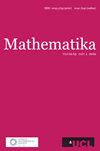关于Carmichael lambda函数分布的两个问题
IF 0.8
3区 数学
Q2 MATHEMATICS
引用次数: 0
摘要
设λ(n)$\lambda(n)$表示乘性群模n的指数。我们证明了当q是奇数时,当n变化时,模q的每个互素残差类同样频繁地被λ(n)$\lambda(n)$击中。在gcd(q,6)=1$\gcd(q,6)=1$的更强假设下,我们证明了均匀分布在Siegel–Walfisz型均匀性范围内持续存在。通过类似的方法,我们证明了λ(n)$\lambda(n)$关于自然密度服从Benford的前导数字定律。此外,如果我们假设广义黎曼假说,那么Benford定律适用于模n的阶,对于任何固定整数a∉{0,±1}$a \notin\lbrace 0,\下午1\rbrace$。本文章由计算机程序翻译,如有差异,请以英文原文为准。
Two problems on the distribution of Carmichael's lambda function
Let denote the exponent of the multiplicative group modulo n. We show that when q is odd, each coprime residue class modulo q is hit equally often by as n varies. Under the stronger assumption that , we prove that equidistribution persists throughout a Siegel–Walfisz-type range of uniformity. By similar methods we show that obeys Benford's leading digit law with respect to natural density. Moreover, if we assume Generalized Riemann Hypothesis, then Benford's law holds for the order of a mod n, for any fixed integer .
求助全文
通过发布文献求助,成功后即可免费获取论文全文。
去求助
来源期刊

Mathematika
MATHEMATICS, APPLIED-MATHEMATICS
CiteScore
1.40
自引率
0.00%
发文量
60
审稿时长
>12 weeks
期刊介绍:
Mathematika publishes both pure and applied mathematical articles and has done so continuously since its founding by Harold Davenport in the 1950s. The traditional emphasis has been towards the purer side of mathematics but applied mathematics and articles addressing both aspects are equally welcome. The journal is published by the London Mathematical Society, on behalf of its owner University College London, and will continue to publish research papers of the highest mathematical quality.
 求助内容:
求助内容: 应助结果提醒方式:
应助结果提醒方式:


